SEO Myths Debunked
SEO writing is an essential skill to build your success in the digital marketing world. The last thing you want is to be led astray in an already competitive space.
In this post, I’ll list out some common and highly destructive SEO myths, debunk them, and help you better optimize your SEO strategy for success.
SEO Myths Debunked
Let’s face it: SEO can be tricky in some regards, but it’s not rocket science.
Almost anyone can get started with the basics, which means a quick Google search will have you countless articles and how-to guides that promise you first-page rankings and quick wins — stuff that’s easy to fall for.
But with so many seemingly authoritative websites publishing oodles of supposedly reliable SEO knowledge, it can often be difficult to tell fact from fiction. Following the wrong advice (even if it’s shared with a genuine intention to help you rank) or myths about SEO will only result in wastage of efforts, time, and money.
And given how Google keeps updating its secretive ranking algorithm multiple times each year, it’s challenging to determine what SEO best practices are outdated and what’s still relevant.
Ironically, you must put faith in what I have to say here, but if improving your website’s Google rankings is one of your goals for 2026 and beyond, you’ll want to keep reading as I bust ten of the top SEO myths being spread by SEO “gurus” on the internet. Let’s dive right in.
1. Social Signals Don’t Impact Rankings
Google is all about ranking valuable content, so it’s not irrational to believe that the more your content gets shared and “liked” on sites like Facebook, Twitter, and Pinterest, the better it’ll rank. After all, if many people share your content, it must be something useful or interesting that’s worthy of ranking, right?
Perhaps, but social signals don’t directly impact rankings — confirms Google’s John Mueller. When asked whether social signals influence organic rankings in Google, he says:
“Not directly, no. So it’s not that there is any kind of a ranking effect there. Social networks also have a no-follow on the links that they kind of provide when they post this content. So it’s not the case that it would give you any kind of a ranking boost there.”
An obvious reason for this is that social signals are easy to manipulate. You can get thousands of shares on your content by spending a few bucks on a site like Fiverr.
That being said, recent studies suggest there’s a correlation between organic rankings and social shares.
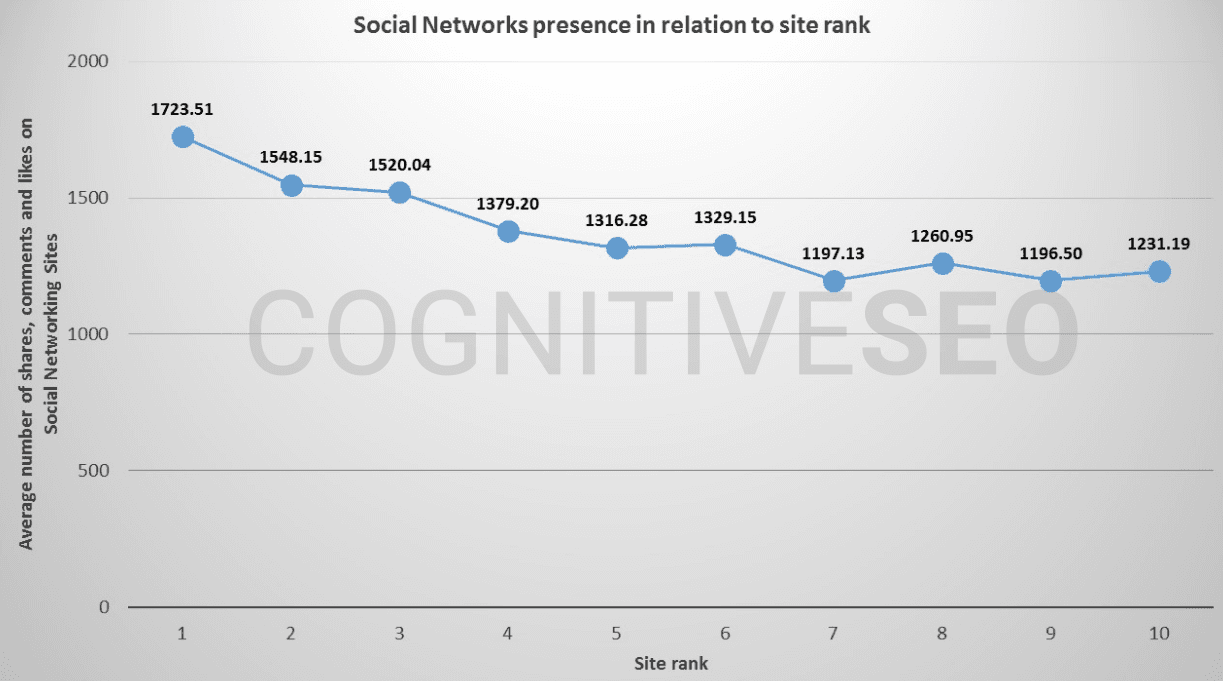
As you can see above, the more social media engagement a website has, the higher it ranks. Here are two plausible reasons behind that:
- More shares on social lead to more exposure, which often gets you more backlinks — and links are a significant ranking factor.
- Content that ranks well in SERPs gets more traffic, and a chunk of those visitors will share the content on social media.
So while social signals (likes, shares, comments, etc.) are not a direct ranking factor, social media posts (such as Tweets and Facebook videos) show up in search results and can rank for branded keywords, thus giving your website more visibility.
And again, backlinks are a ranking factor, and social media can have a positive influence on gaining backlinks. Long story short, albeit indirect, social signals do impact rankings.
2. Keyword Research Is Dead
Google’s Hummingbird update emphasized the ranking algorithm’s ever-increasing focus on understanding natural language search queries, considering context and intent over individual keywords.
The update allowed websites to rank for relevant keywords, even if the exact keywords aren’t present in the content. This led to the myth that keyword research doesn’t matter anymore, which isn’t true.
The Hummingbird update wasn’t meant to kill keyword research or the wise strategy of targeting specific keywords; it aimed to refine the process and deliver a better search experience for users.
Keyword density is something that you don’t have to worry about anymore (discussed later), but matching your audience’s intent by creating the right content — that’s the name of the game.
So, keyword research now focuses more on building topic clusters that target all the right keywords in a strategic and extensive way than traditional keyword research.
The topic cluster model is all about sensibly linking individual pieces of content — each of which targets a particular subtopic — to create a comprehensive repository of content on that topic/subject. This way, users can seamlessly find all the relevant information on a subject without further browsing around the web.
Topic clusters improve the user experience, make your website easier to crawl, and help you rank better as Google loves in-depth content.
To sum up, keyword research isn’t dead — it has merely matured. Rather than stuffing one article with an array of keywords, now you need to think broader and create more articles for a particular topic and then link them together.
3. Pop-ups Are Harmful
Yes, I agree that pop-ups can be pesky when timed wrong, are difficult to close, or are shown repeatedly.
And since Google announced the intrusive interstitial update, many marketers have turned their backs on pop-ups, even if they know that pop-ups have an average conversion rate of over 3% — which isn’t bad by any means.
The thing is, though, Google is only after intrusive pop-ups — ones that don’t allow users to “easily access the content that they were expecting when they tapped on the search result.”
Here’s what they mean by intrusive interstitials:

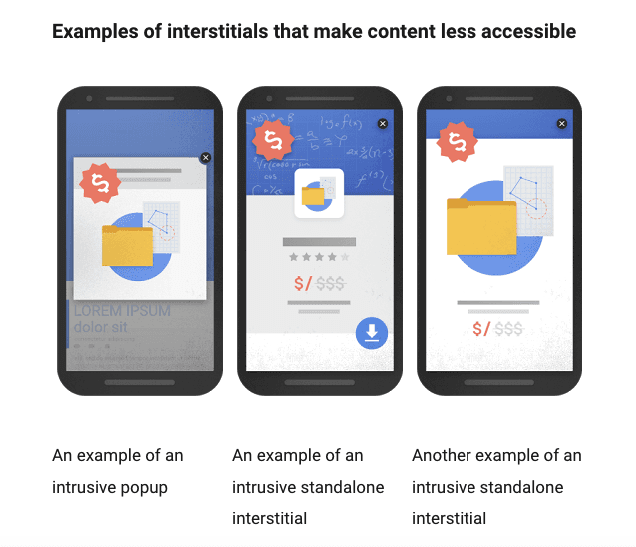
Put simply, pop-ups will only harm your rankings if they interrupt the user experience on your website. Use them right, and they’re a great tool for generating leads.
Follow these best practices and pop-ups aren’t harmful to your SEO:
- Don’t time them to appear right after a user lands on your website.
- Don’t show them repeatedly.
- Make them valuable by offering an exclusive piece of content such as an ebook.
- Make them easy to close.
- Have them occupy a reasonable amount of screen space and not cover the entire page.
All in all, building smart pop-ups is a tried-and-true way to get more opt-ins, and there’s no reason you shouldn’t leverage them.
4. Syndicate Content Hurts Your SEO
This is a popular myth because people often cannot understand the difference between syndicate content and copied content.
Google penalizes websites that copy or spin content (rewrite articles by replacing words with synonyms) from other domains without adding any additional value.
However, syndicate content, aka licensed content, is when you republish the same piece of content (blog post, infographic, explainer video, etc.) on third-party websites to reach a bigger audience. Here, the third-party website can republish the content, clearly mentions the original source, and takes no credit for the piece.
Thus, syndicate content doesn’t violate Private Label Rights (PLR) as the original author maintains the ownership of the piece and offers a Creative Commons license for republishing. It doesn’t equate to plagiarism as the source is cited and linked to.
Many renowned publications use syndicated content and rank at the very top.
If anything, syndicate content helps your blog SEO as not only do you reach a broader audience, but it can help you build links and drive more traffic to your website.
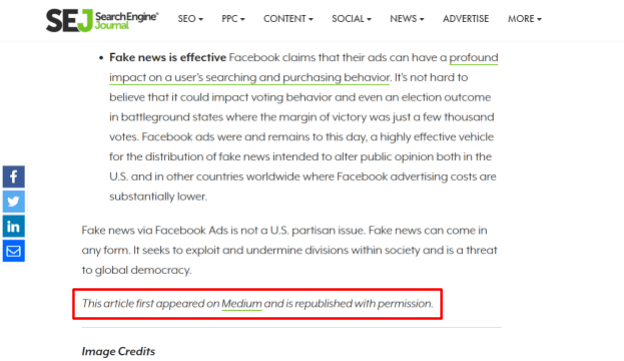
5. Links are Better than Content
Sure, building backlinks to your site from high-quality domains is vital — almost indispensable — to achieving first page rankings. But by no means does that translate to links being better than content.
Links boost your authority in the eyes of Google, but content is how you prove your relevance for your target audience. Content tells Google what search queries, keywords, and phrases to rank your site for, and links help Google to determine how high to rank you.
As with social shares, buying thousands of backlinks for a few bucks on a site like Fiverr is worthless. That’s because such links are usually from low-quality directory submission sites, and they may even hurt your SEO than help it.
Links from bad or shady websites won’t do you any good. And while having more backlinks is good, the quality of those links is just as important, if not more.
So, the bottom line is that your SEO strategy should focus on both — creating and distributing high-quality content and link-building — not one over the other.
6. All Backlinks Are Created Equal
As I mentioned in the previous point, backlinks aren’t the be-all and end-all of your SEO strategy. Links are super crucial to proving your authority to Google and achieving top rankings, but they aren’t created equal.
It is a common fallacy to think that all links pointing to your site are great regardless of who links to you. Don’t fall for that.
Links from untrustworthy and questionable websites will have the opposite effect of making your website seem less credible. If you have many “spammy” links, Google may think you’re buying links (a black-hat SEO technique), and may penalize your website.
Simply put, a couple of links from high-authority websites (such as Search Engine Journal and Forbes) are worth far more than a hundred links from low-quality sites. The former passes more valuable “link juice” to your domain and is worth a lot more.
To reiterate, the backlinks you build or earn should always be from credible websites and authoritative sources. Also, having a great big number of backlinks from dubious websites will likely damage your SEO and reputation. Consider disavowing such links in the Search Console.
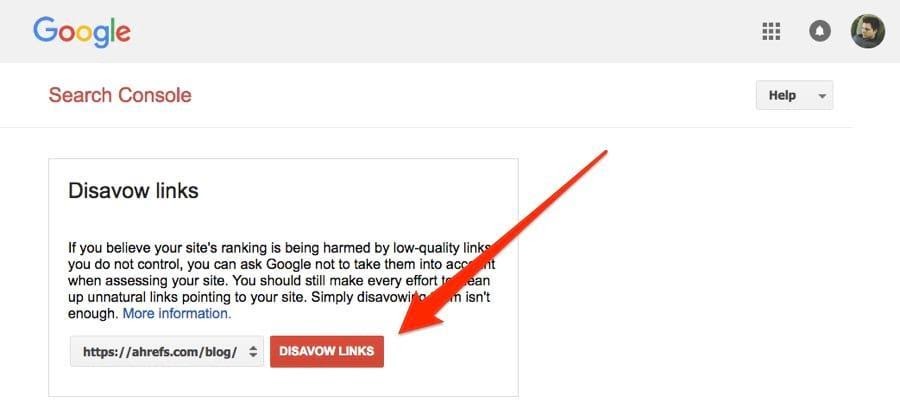
7. Artificial Social Shares Will Boost Rankings
We already talked about how social signals have an indirect impact on rankings and that social shares are indeed easy to manipulate (read “buy”), so they don’t directly boost rankings.
Thus, artificial social shares won’t boost rankings, plain and simple. But let me elaborate on this a bit further.
Facebook clearly specifies how buying fraudulent likes and shares hurt your business in the long run:
“Pages with artificially inflated like counts are harming themselves, making it more difficult and more expensive to reach the people they care about most.”
The social media giant uses machine learning to catch businesses using click-farms and fake accounts to generate artificial engagement. And when they see fraudulent activity, they prevent it by blocking accounts (and it’s not easy to reactivate a suspended account).
In other words, not only do artificial social shares have no impact on search rankings, but they can also destroy your brand’s social media presence. So, steer clear of fake social shares.
8. Rankings Is All SEO Is About
Yes, search engine optimization is obviously about taking steps to bring your website to the top of the SERPs for your target keywords. But as unconvincing as it may sound, SEO is not just about rankings.
SEO is also about fulfilling your users’ needs and desires — to align your content with their pain points and challenges to serve them better. It’s about understanding the audience’s intent and being contextual with your landing pages, as that’s how you’ll engage visitors once you rank well.
Everyone wants to rank first, but they fail to understand that the first spot doesn’t necessarily get the most traffic. An Ahrefs study of 100,000 search queries suggests that the first position page only receives the most chunk of traffic 49% of the time.
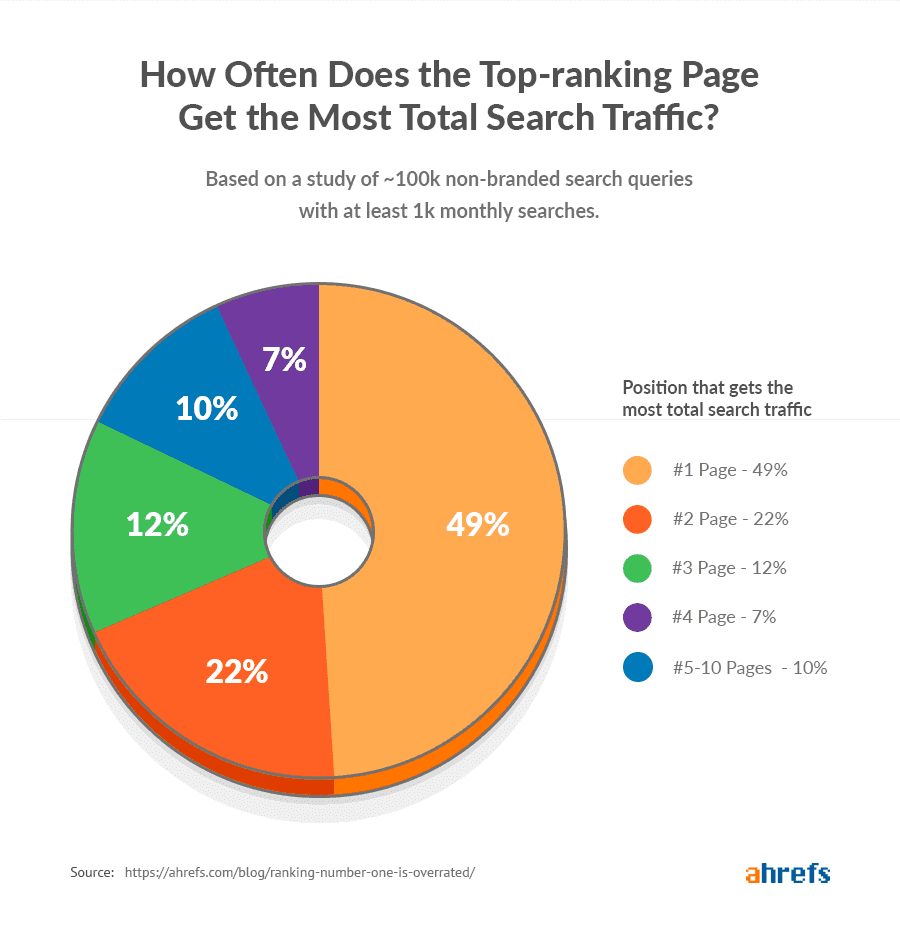
Why? Because most pages earn traffic for various related keywords, not just one.
There are countless instances where the page in position two gets more traffic than the page in position one because it ranks for more keywords.
So, long story short, don’t obsess over achieving the top spot. Instead, focus on optimizing your content to match user intent and driving traffic for multiple keywords.
9. Keyword Density Must Be 2%
Keyword density is the number of times you use a target keyword divided by the total number of words on the page, multiplied by 100. So, if you incorporate your keyword 10 times on a 1000-word page, your keyword density is 1%.
The famous Yoast SEO plugin recommends keyword density between 0.5 and 3%, and most SEO experts believe the ideal keyword density to be around 2%. While that’s good to keep in mind, it’s not a strict rule to swear by.
There’s no need for you to run keyword density analyses on your pages to ensure you hit the 2% mark. Google’s John Mueller confirms this. When asked if there’s any specific limit for keyword density in the content, he says:
“No. We expect content to be written naturally, so focusing on keyword density is not a good use of your time. Focusing too much on keyword density makes it look like your content is unnatural and makes it hard for users to read.”
Google’s algorithm recognizes if you stuff keywords unnaturally for the sake of having a higher keyword density and will consequently ignore the keyword entirely on your website. So if you’re stuffing keywords in your product descriptions in the hopes of ranking higher, it’s time to stop as you’re likely ruining the page for both visitors and crawlers.
Thus, rather than fixating on a specific keyword density, just make sure your content flows naturally and is easy to read. In most cases, you’ll automatically have all keywords — primary, secondary, and semantically related — incorporated seamlessly into the content.
10. SEO Specialists Are Overrated
People often believe this myth because:
- There are too many amateurs and scammers out there who guarantee first-position rankings and then turn out to be bogus, or
- They think SEO is something cushy that a outsourced developer or marketer can manage.
In reality, SEO is not just about backlinks and content. There’s a whole technical side to it — technical SEO, as you may have heard, requires in-depth knowledge and hands-on practice.
SEO is a long-term strategy that requires persistence and the ability to keep up with Google’s ever-changing algorithm updates to apply best practices that work today.
And so, don’t underestimate the importance of having dedicated SEO specialists.
By collaborating with other members of your team — content strategists, copywriters, outreach specialists, and developers — the right SEO folks play a massive role in skyrocketing your brand’s online visibility, traffic, authority, and even sales.
Conclusion
SEO is an ever-evolving field, and there’s a lot of innocent yet destructive advice out there that may sink your site’s rankings. Constant updates and fine-tuning of the ranking algorithm often lead to speculations that turn into rumors, ultimately translating into prevalent myths.
While you’d be wise to take my words with a pinch of salt, I hope I’ve put things into perspective for you so you can concentrate your efforts on the right tactics that are far more likely to bring you the desired results.
Of course, this is not an exhaustive list of SEO myths rampant on the internet, just the most detrimental ones that I think needed to be put to rest.
What SEO myths or misconceptions have you come across or you think are the most harmful? Do share them in the comments below!
About the Author
Zoe is a content marketing strategist for SaaS brands like FollowUpBoss, Mention.com and more. Bylines: Ecwid, ProProfs, Score, etc. On the personal front, Zoe is a pho enthusiast and loves traveling around the world as a digital nomad. **
Gravatar: zoedevitto@gmail.com
Twitter: https://twitter.com/devitto_zoe
